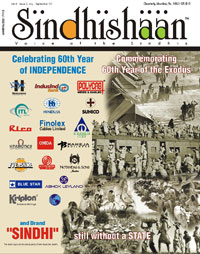WHEN A GIRL TOOK ON THE RAJ
Jyoti Punwani profiles freedom fighter Kamala who once refused to wear the prison knickers of the Raj.
ANGRY SINDHI – After Kamala gave her gold ring to Gandhi, her mother removed all her jewellery, fearing that she might donate them to the cause.
The most boring period in history textbooks comes to life when 92-year-old Kamala Hiranand reminisces. Those infernal Morley-Minto and Montague-Chelmsford reforms, the indistinguishable Non-Cooperation and Civil Disobendience movements, the never-ending pacts and other 'write-short-notes-on' events marked the charming life of this frail Sindhi who looks anything but one.
Kamala was always somewhat pale, so much so that a British collector outside whose office she had spent a whole day lying on a sizzling road in an attempt to prevent the auction of foreign liquor licenses, advised her to look after her own health before taking on the Raj. Her physical condition so alarmed a jailor that she was released before serving her full sentence the first time she was imprisoned.
He probably had other reasons for wanting her out of his jail. From the first day of imprisonment Kamala spelt trouble. She refused to wear prison clothes. Even today, she fumes when she recalls the knickers women had to wear in prison. When the jailor had come down to see what the fuss was about, she told him coldly, “Don't ask me, ask your wife if she approves of such clothes for women.” The toilets were another issue – they had no latches, and the walls were not high enough. Women prisoners had to lock up each other in the toilets, she was told. Too bad, replied the unflappable Kamala, threatening a hunger strike if something was not done immediately.
Kamala's rebellion thrilled the women in the jail. Most of them were uneducated and poor, and they had never dared to fight the prison administration. She on the other hand, had been a fighter all through. Her siblings recount wryly how their home would always have big notices saying, 'Don't spit here', 'Wash your hands here only' and 'Don't make too much noise.' Neither the irritation of family friends nor her mother's curses made any difference to Kamala.
She was the one chosen by her school principal to protest – alone – outside the marriage venue of a judge's son who had taken dowry. She was the one chosen to head the boycott of foreign goods in Hyderabad (Sindh then), which meant sometimes maintaining an all-night vigil outside shops whose owners were too wary to do business during the day. When one such owner accused her of wanting to drive him bankrupt, Kamala gave him her gold ring. He flung it into the gutter. The next morning, his wife was at her door with the ring, and a remorseful husband.
Kamala's life has been defined by a rare resolve. Forced to drop out of school for a couple of years when her mother took ill, she went back to school on her own, bringing admission forms for her father to sign. She could bear the embarrassment of being older than all her classmates, but not the frustration of having to read only whatever she could lay her hands on instead of real textbooks.
It didn't take long for Kamala to shine in school – though not academically. She had the gift of words. She won prizes for poetry and wrote for the local youth newspaper. When time came to fix her marriage, none other than the newspaper's editor was chosen as a suitable match. Husband Hiranand Karamchand was eventually arrested for his writings and Kamala held the fort till she was arrested and the press seized from their home.
Kamala's wedding sari was of white Khadi, spun specially for the occasion by her uncle, Acharya Kripalani. By then, Kamala was known for her strange appearance. In a community known for trading in foreign cloth and love of gold, Kamala wore rough Khadi and no jewellery. Her mother had removed it all after Kamala had handed over her gold ring to Gandhi at a meeting. As she went house to house trying to sell Khadi, the womenfolk shooed her away, thinking no girl from a respectable family could be so shabbily dressed.
But Kamala had her followers – a few girls and a whole troop of boys who acted as her informers, passing on what they had heard in their own homes. Her name was proposed when elections under Provincial Autonomy were announced, but her husband, afraid the experience would go to her head, turned down the candidature.
The Mahatma (as she always refers to him) was part of the atmosphere Kamala grew up in. She married a man whose newspaper was inaugurated by Gandhi. But when this wisp of a girl set out to take on the Empire, her main source of strength was simply her own tenacious will. And this will she still has. When the ancient Arthur Bunder Road (so known from pre-independence times) was changed to Haji Niaz Azmi Road (after politician Abu Asim Azmi's father), she and her brother were the lone crusaders against the change. Everyone else was too scared of Abu Azami. But she actually went to people's homes to get signatures. In vain.



